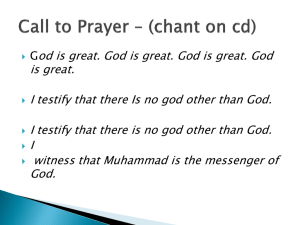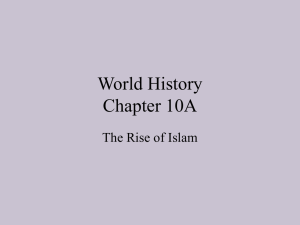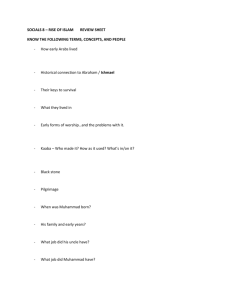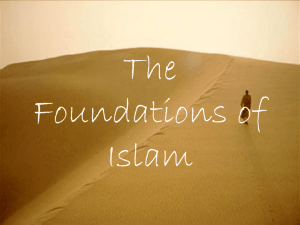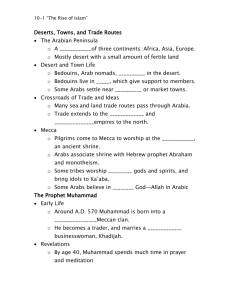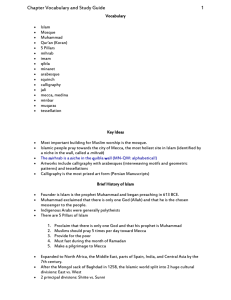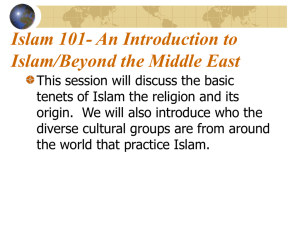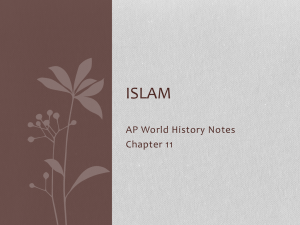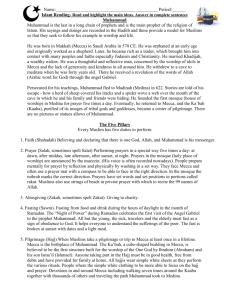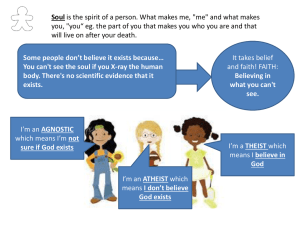World Religions Powerpoint
advertisement
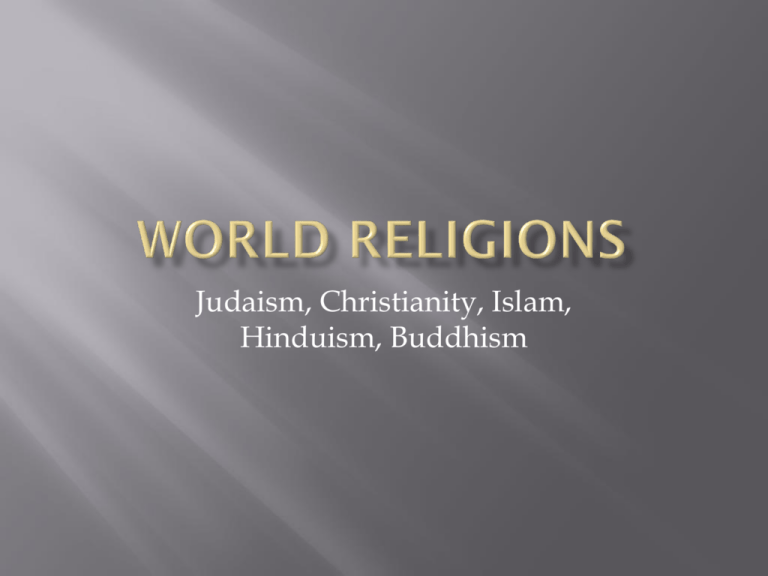
Judaism, Christianity, Islam, Hinduism, Buddhism Torah: first five books of Hebrew bible Abraham: father of Hebrew people Christians consider them part of Old Testament Shepherd from Ur, Mesopotamia, led families & their herds to Canaan (Palestine), the land God promised to Hebrew people Yahweh: only Hebrew God, monotheism Covenant: Abraham promised to obey Yahweh & he agrees to protect Abraham & his descendants Migrated to Egypt, honored at first but eventually enslaved as Pharoah felt threatened Exodus: fled in 1300-1200 B.C. led by Moses Ten Commandments: brought by Moses, written by Yahweh Important to study scriptures & live accordingly Israel: united & formed under Saul, David & Solomon Kingdom divides: Israel (No) & Judah (So.) in 922 B.C. Attacked by Assyrians & Babylonians Jerusalem falls in 586 B.C. Exiled to Babylon but Ezekiel urges Jews to keep religion in foreign land Cyrus the Great returns Jews to Israel in 539 B.C. Come under Roman rule but rebel in A.D. 66 Romans destroy Jerusalem and Jews driven from their land in exile Dispersal of Jews throughout Europe known as Diaspora No political state or homeland existed until Israel is created in 1948 after World War II Day of Remembrance God judges each person individually according to his/her deeds, and makes a decree for the following year Holiest day of the year Day of Atonement Through prayer and complete fasting –abstinence from all food and drink (including water) Bathing, wearing perfume or cologne, wearing leather shoes, sexual relations prohibited on Yom Kippur all designed to ensure attention is completely and absolutely focused on the quest for atonement with God. 8 day festival of lights commemorating the rededication of the Holy Temple in Jerusalem acted as the figurative "footstool" of God’s presence Symbolized by Menorah Jesus: born in Bethlehem in Judea~ 4-6 B.C., raised in Nazareth (northern Palestine). Carpenter, began public ministry at 30 Teachings similar to Judaism: Monotheistic, 10 commandments Preached good, forgiveness & personal relationship with God Apostles: 12 disciples & followers of Jesus Becomes very popular, viewed as Messiah Judea controlled by Romans & Roman Governor Pontius Pilate arrests Jesus Defying Roman authority Sentenced to death, body placed in tomb Appears three days later to his followers then ascends to heaven His teachings spread after death Paul: Jew that sees vision of Jesus & spends rest of his life spreading his teachings Romans persecute Christians They refuse to honor Roman gods Are blamed for economic & political troubles Many killed, crucified, killed by wild animals, became known as martyrs Christianity grows because: Embraced all people Gave hope to the powerless Appealed to those who deterred imperial Rome Offered personal relationship with a loving God Promised eternal life after death Constantinople, Roman emperor accepts Christianity & credits it in military victory Approves it as a religion Made official religion of Rome in 380 A.D. by Theodosius Debates occur about beliefs, New Testament created to end conflicts Contains: four Gospels, Epistles of Paul Added to the Hebrew Bible (Christians refer to as Old Testament) Christian Leadership Priest: leader of the Church Bishop: Priest who supervises several churches Pope: head of Christian Church Monotheistic religion that develops in Arabia in 7th Century Mecca: location of Ka’aba, a religious shrine Religious pilgrims came from all over to worship Many Christians & Jews live in Arabia & Mecca and they believe in one God In Arabic, the belief in one God is called “Allah” Muhammad born in Mecca At age 40 spoken to by an angel, Gabriel taught others Allah was only God, abandon other gods Believed by Muslims to be God’s last & greatest prophet Leads Hijrah: move from Mecca to Medina in 622 Returns to Mecca in 630, destroys idols in Ka’aba Meccans pledge loyalty to Muhammad & convert to Islam In Arabic, Islam means “submission to the will of Allah” Muslim means “one who has submitted” Qur’an: holy book of the Muslims. Revelations Muhammad received from angel Gabriel Sunna: Muhammad’s example for proper living Imam: the worship leader of a mosque and the Muslim community. Faith: “There is no God but Allah, and Muhammad is the Messenger of Allah.” 2. Prayer: 5 X a day, face towards Mecca, at mosque, Islamic house of worship or wherever 3. Alms: responsibility to support less fortunate. Give alms (money for poor) through religious tax 4. Fasting: during Ramadan, from dawn to sunset *spiritual needs greater physical needs 5. Pilgrimage: hajj to Mecca all Muslims must take 1. Allah is same God (just different name) that is worshiped Muslims view Jesus as a prophet not son of God All three believe in heaven and hell, and a day of judgment All three trace ancestry to Abraham No eating, drinking, smoking or sexual relations during sunset to sundown 9th month of Muslim calendar, when Quran was sent down from heaven Fast ends with meal & prayer at sunset The good that is acquired through the fast can be destroyed by a bad deed (greed, theft, slander, etc.) 2012: Began on July 20, lasted for 30 days Photos: http://www.boston.com/bigpicture/2012/07/ra madan_2012_begins.html Cannot be traced to one founder Religion liberates the soul from everyday difficulties Recite daily verses from the Vedas Upanishads: teacher’s comments on the Vedic hymns Dialogue between teacher & student about liberation Goal is Moksha: release from cycle of birth, death and birth again (reincarnation) Deity: Brahman, personality of three gods Caste system controls of a person’s life Brahma (creator), Vishnu (protector), Shiva (destroyer) Who to eat or talk with, dress, what to eat, cleanliness Birthplace was a result of karma earned from previous life Hindus today can choose any deity or none Religious leader is Guru Place of worship is home Diwali: religious holiday, “festival of lights” Originated in India but never a significant religion More prominent in SE Asia Founded by Siddhartha Special at birth, kept inside palace until 29 Spends adult life searching for religious truth & end suffering Six years in Indian forests seeking enlightenment Became known as Buddha After he concludes to the cause of human suffering 1. 2. 3. 4. Life is filled with suffering and sorrow The cause of all suffering is people’s selfish desire for the temporary pleasures of this world The way to end all suffering is to end all desires The way to overcome such desires and attain enlightenment is to follow the Eightfold Path, which is called the Middle Way between desires and self-denial. Right Views Right Livelihood Right Resolve Right Effort Right Speech Right Mindfulness Right conduct Right Concentration Buddhists seeking enlightenment must master one step at a time. • This would occur over many lifetimes • • By following eightfold path, you could reach Nirvana • • • Buddhists also believe in reincarnation The release from selfishness and pain Pray daily and follow texts from the Tripitaka Monks & Nuns Took vows to live a life of poverty, nonviolent and not marry Spread Buddha’s teaching in the streets of India, carried begging bowl for daily charity offerings Retreated to caves in rainy season These caves developed into Monasteries Trade helped spread Buddhism to Sri Lanka, Burma, Thailand, China, Korea, Japan Religion Deity Followers Text Place of worship Prophet Religious Leader Sabbath Location Started Holiday Current Geographic Location(s)/countries where it exists Additional/extra information Judaism Christianity Islam Hinduism Buddhism




